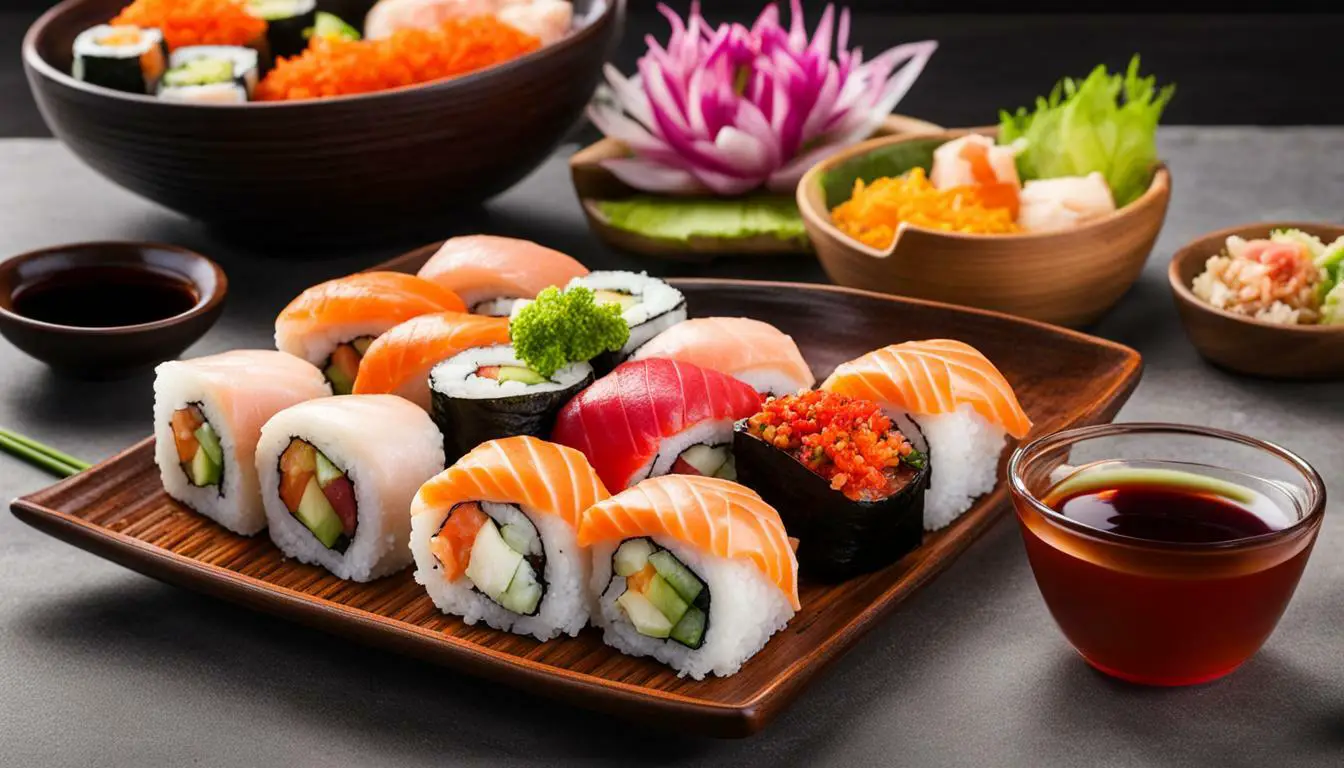
This post may contain affiliate links. Please read my disclosure for more information.
Looking for a substitute for vinegar in your sushi? Look no further! We have compiled a list of five ideal alternatives that will give your sushi the perfect balance of acidity and flavor.
When it comes to substituting vinegar in sushi, there are several options to consider. One popular choice is white wine vinegar, which has a mild and slightly acidic taste that complements sushi well. Another option is apple cider vinegar, which has a mild flavor with a hint of apple and can be used in place of rice vinegar in any recipe. Lemon or lime juice can also be used to add acidity and flavor to sushi rice and other dishes. Champagne vinegar is another substitute, with its light and delicate flavor that won’t overpower the final product. Lastly, seasoned rice vinegar, made by adding sugar and salt to regular rice vinegar, is a great substitute in recipes that call for additional salt or sugar.
Overall, there are plenty of alternatives to rice vinegar that can be easily used in sushi making. Whether you choose white wine vinegar, apple cider vinegar, lemon or lime juice, champagne vinegar, or seasoned rice vinegar, each option offers a unique flavor profile that can elevate your sushi experience.
White Wine Vinegar: A Perfect Substitute for Vinegar in Sushi
When it comes to substituting vinegar in sushi, white wine vinegar is an excellent option for those looking to enhance the flavors of their sushi rolls. Its mild and slightly acidic taste provides the perfect balance of flavors, creating a delightful dining experience.
This versatile alternative can be used in the same quantities as rice vinegar in your sushi recipes, ensuring that you achieve the desired taste without compromising on authenticity. Whether you’re making traditional sushi rolls or experimenting with unique flavor combinations, white wine vinegar seamlessly blends with the ingredients, resulting in a harmonious flavor profile.
By opting for white wine vinegar, you can make your sushi rolls even more flavorful. The subtle acidity adds brightness to the rice and complements the other components, such as fresh fish, vegetables, and seaweed. Embrace the versatility of white wine vinegar and elevate your sushi-making skills to new heights.
A Perfect Addition to Your Sushi Journey
- Provides a mild and slightly acidic taste
- Complements the flavors of sushi perfectly
- Can be used in the same quantities as rice vinegar
- Enhances the overall flavor profile of sushi rolls
Next time you find yourself in need of a substitute for vinegar in sushi, consider reaching for a bottle of white wine vinegar. Its distinctive taste will take your sushi creations to the next level, ensuring a memorable dining experience for you and your guests.
Apple Cider Vinegar
If you’re looking for a vinegar alternative with a touch of sweetness, consider using apple cider vinegar in your sushi. Its mild flavor will enhance the taste of your rolls. Apple cider vinegar offers a subtle hint of apple, making it a suitable substitute for rice vinegar in any sushi recipe. You can use it in the same proportion as rice vinegar to achieve a delightful taste.
- Apple cider vinegar adds a mild acidity to the sushi rice, balancing the flavors of other ingredients.
- It complements the freshness of fish and the creaminess of avocado, creating a harmonious flavor profile.
- The slightly sweet undertone of apple cider vinegar adds a unique twist to traditional sushi rolls.
Next time you’re making sushi and find yourself without rice vinegar, reach for apple cider vinegar for a delicious and unexpected substitute.
Lemon or Lime Juice: A Tangy Twist for Your Sushi Rice
Add a tangy twist to your sushi rice by using lemon or lime juice instead of vinegar. The citrusy flavor will give your sushi a refreshing kick. Simply squeeze fresh lemon or lime juice onto the rice, adjusting the amount to your taste preferences. Here are a few reasons why lemon or lime juice makes a great substitute for vinegar in sushi:
- Bright acidity: Lemon or lime juice provides a bright and tangy acidity that lifts the flavors of your sushi rice. The zesty notes complement the other ingredients and add a burst of freshness to each bite.
- Refreshing taste: The citrusy flavor of lemon or lime juice brings a refreshing taste to your sushi. It balances the richness of ingredients like fish and avocado, making each roll more enjoyable.
- Versatility: Lemon or lime juice can be used in various sushi recipes, from classic rolls to poke bowls. Its versatility allows you to experiment and create different flavor combinations that suit your preferences.
So the next time you’re making sushi at home, give lemon or lime juice a try as a substitute for vinegar. It’s a simple yet effective way to elevate the taste of your sushi and impress your guests. Enjoy the tangy twist and savor the deliciousness!
Champagne Vinegar: A Sophisticated Twist for Your Sushi
For a sophisticated touch to your sushi, consider using champagne vinegar as a substitute for traditional rice vinegar. Its light and delicate flavor will elevate your sushi to new heights.
Champagne vinegar offers a unique taste that won’t overpower the other ingredients in your sushi rolls. Its subtle notes add a touch of elegance to the final product. This alternative to rice vinegar can be used in the same proportion, making it an easy substitution for your favorite sushi recipes.
Why Choose Champagne Vinegar?
There are several reasons why champagne vinegar is a great option for enhancing the flavors of your sushi. Here are some key points:
- Light and delicate flavor: Champagne vinegar adds a subtle tang and complexity to your sushi rice without dominating the overall taste. This allows the other ingredients to shine.
- Enhances the presentation: The light color of champagne vinegar will prevent your sushi rice from turning dark, ensuring an appetizing appearance.
- Pairs well with seafood: The delicate flavor profile of champagne vinegar complements the natural sweetness of seafood, enhancing the overall flavor profile of your sushi rolls.
With these benefits in mind, incorporating champagne vinegar into your sushi-making routine can bring a touch of elegance and sophistication to your creations.
Seasoned Rice Vinegar
If you’re looking to enhance the flavors of your sushi rice, seasoned rice vinegar is the perfect substitute for regular vinegar. Its added salt and sugar will give your sushi rice a deliciously seasoned taste. Seasoned rice vinegar is made by combining regular rice vinegar with sugar and salt, creating a well-balanced flavor profile that complements the other ingredients in your sushi roll.
Using seasoned rice vinegar as a substitute is easy. Simply replace the amount of rice vinegar called for in your recipe with the same quantity of seasoned rice vinegar. This ensures that your sushi rice has the right level of acidity and sweetness, making your rolls taste just as good as if you had used traditional rice vinegar.
One of the advantages of using seasoned rice vinegar is that it eliminates the need to add additional salt or sugar to your sushi rice. This can save you time and effort when preparing your ingredients. Plus, the balanced flavor of seasoned rice vinegar will enhance the taste of your sushi, allowing the other flavors to shine through.
Why choose seasoned rice vinegar?
- It provides a well-balanced flavor profile for your sushi rice.
- It saves time and effort by eliminating the need for additional salt or sugar.
- The added salt and sugar give your sushi rice a deliciously seasoned taste.
- Seasoned rice vinegar enhances the overall flavor of your sushi, allowing other ingredients to shine.
Next time you’re making sushi and find yourself without rice vinegar, reach for seasoned rice vinegar as a substitute. Its unique flavor will elevate your sushi experience and impress your taste buds.
Conclusion
Don’t let the absence of vinegar in your pantry hinder your sushi-making endeavors. With these ideal substitutes, you can create a delightful sushi roll that is rich in flavor and satisfaction.
When it comes to substituting vinegar in sushi, there are several options to consider. One popular choice is white wine vinegar, which has a mild and slightly acidic taste that complements sushi well. Another option is apple cider vinegar, which has a mild flavor with a hint of apple and can be used in place of rice vinegar in any recipe.
Lemon or lime juice can also be used to add acidity and flavor to sushi rice and other dishes. Simply squeeze fresh lemon or lime juice onto the rice, adjusting the amount to your taste preferences. For a light and delicate flavor, you can try using champagne vinegar as a substitute. Its subtle taste won’t overpower the final product, allowing the other ingredients to shine.
Lastly, seasoned rice vinegar, made by adding sugar and salt to regular rice vinegar, can be used as a substitute in recipes that call for additional salt or sugar. It provides a balanced and seasoned taste to your sushi rice. Overall, there are plenty of alternatives to rice vinegar that can be easily used in sushi making.
FAQ
What are some substitutes for vinegar in sushi?
Some ideal substitutes for vinegar in sushi include white wine vinegar, apple cider vinegar, lemon or lime juice, champagne vinegar, and seasoned rice vinegar. Each alternative offers a unique flavor profile that can enhance your sushi experience.
How can white wine vinegar be used as a substitute for vinegar in sushi?
White wine vinegar has a mild and slightly acidic taste that complements sushi well. It can be used in the same quantities as rice vinegar in sushi recipes to achieve a delicious flavor.
Can apple cider vinegar be used instead of vinegar in sushi?
Yes, apple cider vinegar can be used as a substitute for rice vinegar in sushi. It has a mild flavor with a hint of apple and can be used in the same proportion as rice vinegar in sushi recipes.
What role does lemon or lime juice play as a substitute for vinegar in sushi?
Lemon or lime juice can add acidity and flavor to sushi rice and other sushi dishes. Simply squeeze fresh lemon or lime juice onto the rice, adjusting the amount to your taste preferences.
How does champagne vinegar work as a substitute for vinegar in sushi?
Champagne vinegar is a light and delicate alternative to rice vinegar in sushi. Its subtle flavor won’t overpower the final product, allowing other ingredients to shine. Use champagne vinegar in the same proportion as rice vinegar for an elegant twist on your sushi rolls.
What is seasoned rice vinegar and how can it be used in sushi?
Seasoned rice vinegar is regular rice vinegar that has been enhanced with the addition of sugar and salt. It can be used as a substitute in sushi recipes that call for additional salt or sugar, providing a balanced and seasoned taste to your sushi rice.
Are there other alternatives to rice vinegar that can be used in sushi making?
Yes, there are plenty of alternatives to rice vinegar that can be easily used in sushi making. Some options include white wine vinegar, apple cider vinegar, lemon or lime juice, champagne vinegar, and seasoned rice vinegar. Each substitute offers a unique flavor profile that can enhance your sushi experience.


